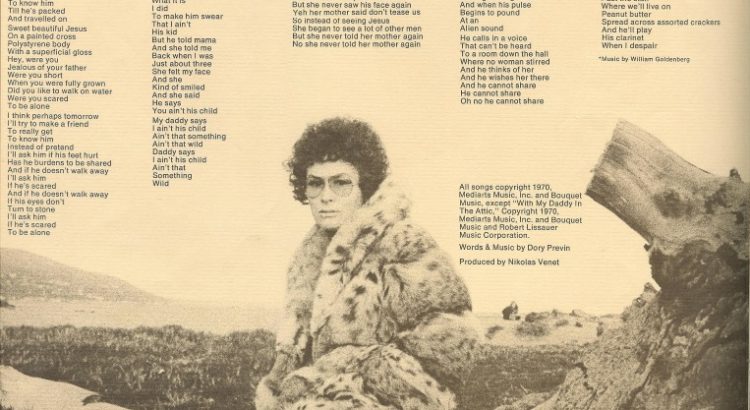Let’s be clear: I’m not here to discuss Father John Misty. However, I owe it to him to begin this piece by mentioning a playlist he began curating via Spotify a couple years back (in true Father John Misty form, it’s titled Father John Misty’s Father John Misty Playlist). I remember cueing it up with my boyfriend on a road trip one weekend in college, skipping the tracks we already knew and loved from folks like Harry Nilsson or John Fahey, hungry for new sounds to sink into. At some point in the shuffling, Dory Previn’s “Atlantis” began to play:
I lie in bed
beside him
and I know him
outside in
I’ve learned his body’s
line and length
and memorized his grin
I’ve counted
every crease
at the edges
of his eyes
I know his soul’s
complete circumference
I know
his lies
She unfurls these lyrics by way of a sensuous melody, yet her voice remains a bit withheld and guarded; there is no glimmer of a “come hither” sexiness. There’s a show tune-ish-ness to the melody, but no “All That Jazz” cuteness. She sounds kind of in awe, a little bit afraid, maybe wounded. She sounds wild, too.
Hearing “Atlantis” was all I needed. I immediately researched all that I could on Dory Previn née Dorothy Lanagan and learned that she’d passed away on Valentine’s Day in 2012. I found that her life was as complex and winding as her songwriting. She’d been both a writing partner and a life partner to the famous Hollywood composer André Previn before he had an affair and child with actress Mia Farrow in 1969. Dory’s already fragile mental state reached a breaking point when the couple divorced. And when André Previn married Farrow, Dory was hospitalized for her psychosis. Eventually, she began writing her own singer-songwriter tunes as a part of her healing process. One of the first was a song outlining her ex-husband’s affair called “Beware of Young Girls”:
Beware of young girls
Who come to the door
Wistful and pale of twenty and four
Delivering daisies with delicate hands
This track, among others exploring other vulnerable themes such as her childhood trauma (“With My Daddy in the Attic”), fear (“Scared To Be Alone”), and psychosis (“Mister Whisper”) appeared on her debut solo album On My Way To Where (1970). She went on to record five more solo albums in the ‘70s, and one live album at Carnegie Hall.
On her 1974 self-titled album on the Warner Bros label, her voice seems to have reached a new peak of gumption and ease. Tracks such as “Coldwater Canyon” and “Brando” present as a direct commentary on Previn’s zeitgeist in ’70s L.A., both lyrically and musically. Her observations and descriptions are as sharp (and often funny) as ever, but shadowed with a sinuous, poignant longing and self-awareness. Folky instrumentation like steel guitar and Latin-style drums are punctuated with a show-tune-ish urgency that Previn reappropriated from her past to support sophisticated and catchy melodies that effortlessly wield an emotional narrative.
These songs are at once self-deprecating, profound, feminist, dark, funny, sweeping, strange, unique to their time, and ahead of their time. One of my personal favorites is the last track on Dory Previn, “Did Jesus Have a Baby Sister?”:
Did she long to be the saviour
Saving everyone
She met?
And in private to her mirror
Did she whisper:
Saviourette?
Saviourwoman?
Saviourperson?
Save your breath!
The background vocals are searing on this track and the chord changes sound intuitive but are quite complex. There is a less groovy but equally probing song called “Woman Soul” off of 1976’s We Are Children Of Coincidence that brings wonderful nuances to the love song form. I think it speaks to what we might today call “toxic masculinity” with great empathy:
I love him ‘cause he questions all the roles he’s forced to play
‘Grown men don’t cry’: he sees the lie, and cannot change his way
Oh, but he does the best he can; that’s why I love that man
But I also love the woman in his soul
In addition to her records, Dory Previn also published a trio of autobiographies in her lifetime: “On My Way to Where”, “Midnight Baby”, and “Bogtrotter”. They feel like extended liner notes, her lyrics interwoven with stream-of-consciousness narratives and an occasional poem. Her books overlap non-linearly and further explore her troubled childhood and her rise to songwriting in L.A. after several odd jobs including salesgirl, secretary, and chorus girl. She details her inner world and psychosis with a disarming vulnerability. One of my favorite poems included in any of her books is titled “Listen”. I was thrilled when I came across a clip of her on Irish television reading this poem in her inimitably playful yet serene tone:
The feeling in my blood-flow
Is a simple thing you see
I am it
I am it
We are everything and nothing
But that’s how to play the game
In these weatherbeaten bodies
With these godforsaken brains
We can listen
Listen
Listen to the universe resounding
In the pulsing and the pounding
Of our infant ancient veins
Listen
Listen
Listen and it all begins to fit
You are it
Dory’s records have become an anchor for me when I yearn for music to be a space for making meaning beyond sounds and words alone. I find myself enchanted by her snarky honesty, her wistfulness, her admissions of uncertainty and her occasional turns toward nurturing. I am simultaneously shocked and comforted by her voice. And when I’m feeling weatherbeaten I will watch that funny little video, sometimes on repeat. Listen, and it all begins to fit. You are it.
Lauren Turner
Shout, Sister, Shout!
Sundays 1-2 pm


